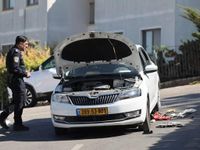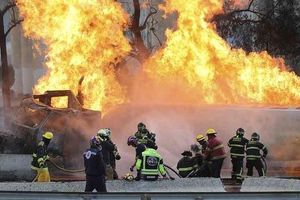On September 12, 2025, a wave of violence and heightened security measures gripped Jerusalem and the West Bank, as Israeli and Palestinian tensions erupted in a series of incidents that left two men critically wounded and dozens arrested. The day began with a shocking stabbing attack at a hotel near Jerusalem, where a Palestinian man from East Jerusalem targeted two guests in what authorities quickly labeled a militant assault. According to police statements reported by multiple news agencies, the suspect was detained at the scene and has been identified as having ties to East Jerusalem.
The victims of the stabbing, both male, were rushed to a nearby hospital in critical condition. The attack sent shockwaves through the city, already tense from recent violence and ongoing security operations. Israeli officials swiftly condemned the incident and promised a robust response. The stabbing comes amid a broader escalation of hostilities that has seen both sides suffer casualties and endure growing unrest.
In the days leading up to the hotel attack, Jerusalem had already been reeling from a deadly shooting at a city bus station on September 8, 2025. That attack, which claimed the lives of six Israelis, set off a sweeping Israeli military response. According to reporting from The Jerusalem Post, the Israel Defense Forces (IDF) launched Operation 'Protect Jerusalem,' led by the Benjamin Brigade, targeting the Ramallah-area villages of Al-Qubeiba and Qatanna—where the perpetrators of the bus shooting were believed to have originated.
Over the course of several days, the IDF arrested more than 20 Palestinian terror suspects in Al-Qubeiba and Qatanna. Security forces also conducted extensive raids across the central and northern West Bank, detaining 21 additional wanted individuals. The military operation was marked by the confiscation of weapons, cartridges, military equipment, and ISIS flags, as well as the seizure of tens of thousands of shekels in alleged terror funds. In a statement, the IDF confirmed that more than 700 targets were searched as part of the crackdown, and five houses belonging to individuals identified as terrorists were destroyed. Among the items seized were 38 "airsoft" non-deadly weapons and various weapon parts.
The Israeli government has defended these sweeping measures as necessary to restore security and prevent further attacks. "We will not tolerate violence against our citizens, and we will act decisively to dismantle terror networks wherever they exist," said an Israeli security official, reflecting the determination of authorities to make good on Prime Minister Benjamin Netanyahu's repeated vows to ensure national security. Netanyahu himself has been vocal in recent weeks, famously declaring, "There will be no Palestinian state," a stance that has drawn both domestic support and international criticism.
For many Palestinians, however, the ongoing raids and demolitions have become a source of deep anger and frustration. Residents of Al-Qubeiba and Qatanna described the overnight operations as intense and disruptive. "Our village was surrounded. Soldiers searched every house, and many young men were taken away," one local resident told Al Jazeera. The destruction of homes belonging to accused terrorists has long been a controversial Israeli policy, criticized by human rights groups as collective punishment. Israeli officials, by contrast, argue that such demolitions serve as an effective deterrent against future attacks.
The confiscation of ISIS flags and military equipment during the raids has heightened concerns about the potential for radicalization and the spread of extremist ideology in the region. Security analysts warn that, while the majority of attacks in recent years have been linked to established Palestinian factions, the presence of ISIS symbols signals a worrying trend. "The discovery of ISIS flags is alarming. It suggests that global jihadist ideology may be gaining a foothold among some militants," said a former Israeli intelligence officer quoted by Haaretz.
Meanwhile, the Palestinian Authority has condemned the Israeli military operations, calling for restraint and an end to what it describes as collective punishment. In a statement, a spokesperson for the Authority said, "These actions only deepen the cycle of violence and undermine prospects for a peaceful resolution." International organizations, including the United Nations, have echoed these concerns, urging both sides to avoid further escalation and to protect civilians.
The events of September 12 unfolded against a backdrop of mounting tension and mutual distrust. The stabbing near Jerusalem underscored the volatility of the situation, with the attacker’s East Jerusalem origin highlighting the complex and often fraught relationship between different communities in and around the city. East Jerusalem, annexed by Israel after the 1967 Six-Day War but claimed by Palestinians as the capital of a future state, remains a flashpoint for violence and political dispute.
The Israeli military’s response to the bus station shooting and subsequent attacks has been shaped by a broader strategy of deterrence and rapid intervention. Operation 'Protect Jerusalem' is just the latest in a series of campaigns aimed at rooting out militant networks in the West Bank. According to the IDF, the operation’s goals include not only apprehending suspects but also disrupting the logistical and financial infrastructure that supports terror activities. The seizure of funds and weapons, officials argue, is crucial to preventing future attacks.
For ordinary residents of the affected villages, however, the impact of these operations is immediate and deeply felt. Many families have been left without homes, and the mass arrests have sparked fears of further reprisals. Community leaders in Al-Qubeiba and Qatanna have called for international intervention and support, warning that the current trajectory risks pushing more young people toward radicalization.
As night fell on September 12, Jerusalem and the West Bank remained tense but largely quiet, with security forces maintaining a heavy presence. Hospitals in Jerusalem continued to treat the two men critically injured in the hotel stabbing, while families across the region awaited news of loved ones detained in the raids. For many, the day’s events were a stark reminder of the fragility of peace—and the ever-present risk of renewed violence.
The situation in Jerusalem and the West Bank on September 12, 2025, stands as a sobering testament to the enduring complexity and volatility of the Israeli-Palestinian conflict. As both sides grapple with the aftermath of violence and the consequences of sweeping security operations, the prospects for calm seem as uncertain as ever.




